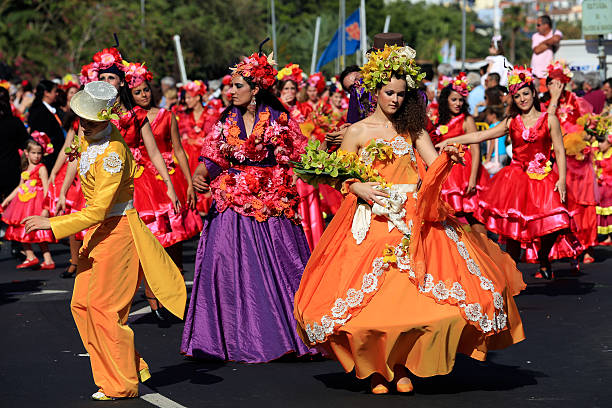Portugal is a small nation that is part of the Iberian Peninsula, shared between this country and Spain. The culture of Portugal is rich, varied and influenced by different cultures, such as the Romans and
Portugal is a small nation that is part of the Iberian Peninsula, shared between this country and Spain. The culture of Portugal is rich, varied and influenced by different cultures, such as the Romans and the Moors.
Portugal was also an important center for the Jewish people during the Middle Ages, so you can find some customs, mainly in the gastronomy, which was influenced by Jewish traditions.
In addition, Portugal has a rich history in art and architecture, with many places declared World Heritage Sites by UNESCO. These include the Batalha Monastery, Braganza Palace, Coimbra Cathedral and Christ Church Convent, which are all must-see places in Portugal.
In today’s article, we will show you everything you need to know about the Portuguese culture. Want to know more about the culture and customs of Portugal? Let’s go together for this new trip!
Characteristics of the Portuguese culture
Language and Literature in Portugal
The Portuguese language is a Romance language that evolved from a Latin-based ancestor called Vulgar Latin. Literature in Portugal was born between the 12th and 14th centuries, when what is now called the Portuguese language emerged. The first document of which there is evidence is the Galician-Portuguese lyric, which had the particularity of being composed of short songs or cantigas.
In the fifteenth century, it began the tradition of the chronicle with Fernão Lopes. In poetry, the influence of the Italian Renaissance is marked. In the sixteenth century, new genres join the literature in Portugal. For example, pastoral poetry, where writers like António Ferreira, Diogo Bernardes and Pedro de Andrade Caminha emerge, all followers of the Italian school, and the national epic culture intensifies.
During the 16th century, prose was devoted to history and travel stories. In the seventeenth century, the Baroque left great traces in the lyric and prose. Thus, one attends the birth of the history, the biography, the religious eloquence and the epistolary genre.
In the first half of the eighteenth century, we observe changes that culminate in a literary reform known as romanticism. The prose of the eighteenth century is mainly devoted to scientific subjects. At the beginning of the 20th century, there was the emergence of the Renascença Portuguesa group, a nostalgic and subjective movement. In the 1970s, María Isabel Barreno, María Teresa Horta and María Velho da Costa published works with strong feminist and erotic content, which were even censored in Portugal for some years.
At the beginning of the 21st century, Portuguese literature received the Nobel Prize for Literature thanks to José Saramago, author of novels such as Essay on Blindness, which gave an important boost to the country’s writers. Another of the great personalities of Portuguese literature is Fernando Pessoa.
The Gastronomic Culture of Portugal
Portuguese cuisine is influenced by many cultures, such as Spanish, French and Moorish. Thus, the Portuguese love their food, especially fish and shellfish. Many of their dishes are prepared with these ingredients. Portuguese dishes include pastéis de Belém (egg tarts), bacalhau (salted cod), piri-piri chicken (chicken marinated in lemon juice), duck rice and pork kebabs Alentejo style.
One of the curiosities of the typical Portuguese cuisine is that the Portuguese are credited with introducing tempura to Japan. Icons of Japanese cuisine, these bite-sized pieces of breaded and fried vegetables and seafood were actually introduced to Japan by Portuguese missionaries and traders in 1543.
Music of the Portuguese Culture
The most famous musical expression of the Portuguese culture is the Fado. It is believed that this musical style exists since 1838, however, no historian has been able to reveal its origins. Nevertheless, there is no doubt that it was born in the working classes. It is usually sung by a single person accompanied by the viola and the Portuguese guitar. Its main theme is life. Fado, in 2011, was included by UNESCO in the representative list of intangible cultural heritage of humanity.
Another characteristic of Portugal is that it has a wide variety of musical instruments that give its popular music a special touch. Among them are the cavaquinho, the Foles bagpipe, the viola Braguesa, the adufe and the Palheta.
How the Portuguese Are
Among the cultural aspects of Portugal, it is worth noting that families are very close, often living together in large houses with several generations under the same roof. It is also common for grandchildren to take care of their grandparents as they age.
The Portuguese are a proud people. They are known around the world for defending their rights, but also for defending their food. They have also proven to be a warm and friendly society.
Typical Portuguese Dances
One of the most authentic traditions of Portugal are its typical dances. They are the following ones:
– Corridinho: It is danced with the couples always close to each other, forming a circle, the women inside and the men outside. When the rhythm changes, the couples get closer and dance holding each other, turning in the same place. However, there are variations depending on the region of the country.
– The fandango: It arrived in Portugal in the eighteenth century from the Spanish theater. It spread to all social strata of the country, although years later it was considered an obscene dance. But this was later abandoned.
– Vira: It is quite similar to the Australian waltz and the women wear a white shirt and a red headdress.
– Chula: Noted for its fast movements and strong steps.
– Pauliteiros de Miranda: It is characteristic because a pole is part of the dance outfit. Thus, groups of eight men dress in skirts and dance to the rhythm of the music.
As you can see Portugal is home to a rich culture, worth discovering. So when are you planning your trip to this fabulous country? Let us know in the comments below.

